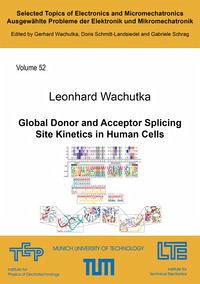Extensive in vitro studies have strongly advanced our understanding of the splicing process, but the kinetics of the successive catalytic steps of splicing in vivo remains far less understood. Using Transient Transcriptome sequencing (TT-seq) enabled, for the first time, the genome-wide quantification of the half-lives of individual donor site and acceptor site bonds as well as the rate of formation of splice junctions. A careful analysis of the kinetic times provided the basis for a systematic search for genetic predictors of fast and slow splicing processes. It turned out that the donor site cleavage time is limited by polymerase elongation and allowed for estimating the interaction effects between several spliceosome components and the RNA at single nucleotide resolution. These findings agree very well with published structural data. During this study it was necessary to set up solid mathematical models of single bond splicing kinetics to overcome the experimental ambiguities caused by alternative splicing. With a view to facilitating similar analyses for other researchers, the software package rCube has been developed, which opens an easy access to the analysis of TT-seq data to estimate RNA kinetics. It is not only applicable to infer splicing kinetics, but also allows for the high precision measurement of RNA turnover rates.
Bitte wählen Sie Ihr Anliegen aus.
Rechnungen
Retourenschein anfordern
Bestellstatus
Storno

